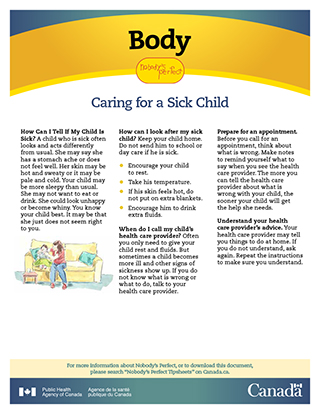
Caring for a Sick Baby: A Comprehensive Guide for Parents
When your precious little one falls ill, it can be an overwhelming and stressful experience for parents. Witnessing your baby’s discomfort and vulnerability can trigger a rollercoaster of emotions. However, it’s crucial to remain calm and composed to provide the best possible care for your sick baby. This comprehensive guide will equip you with the knowledge and practical tips to effectively care for your sick baby at home.
Recognizing the Signs of Illness
The first step in caring for a sick baby is recognizing the signs and symptoms of illness. Common indicators include:
- Fever (temperature above 100.4°F or 38°C)
- Irritability or fussiness
- Decreased appetite or difficulty feeding
- Coughing or sneezing
- Runny nose or congestion
- Diarrhea or vomiting
- Lethargy or lack of energy
- Unusual skin rashes or discoloration
Seeking Medical Attention
If your baby exhibits any of these symptoms, it’s essential to seek medical attention promptly. Contact your pediatrician or visit the nearest emergency department if:
- Your baby is under 3 months old and has a fever.
- Your baby has a fever that persists for more than 24 hours.
- Your baby has difficulty breathing or is wheezing.
- Your baby is vomiting or has diarrhea that does not improve after 24 hours.
- Your baby is lethargic or unresponsive.
- You suspect your baby has a serious infection or injury.
Home Care for Sick Babies
In most cases, minor illnesses can be managed at home with proper care. Here are some essential steps to follow:
1. Rest and Comfort:
- Ensure your baby gets plenty of rest.
- Create a comfortable and soothing environment by dimming the lights and minimizing noise.
- Hold your baby close and provide gentle cuddles to offer comfort.
2. Hydration:
- Dehydration is a common concern in sick babies.
- Offer your baby frequent sips of breast milk, formula, or electrolyte solutions (such as Pedialyte).
- Avoid sugary drinks like juice or soda, as they can worsen dehydration.
3. Fever Management:
- Use a cool washcloth or sponge bath to reduce fever.
- Administer over-the-counter fever reducers (such as acetaminophen or ibuprofen) as directed by your pediatrician.
- Avoid aspirin, as it can be harmful to babies.
4. Cough and Congestion Relief:
- Use a humidifier or vaporizer to add moisture to the air and help loosen congestion.
- Saline nasal drops can help clear nasal passages.
- Avoid cough suppressants, as they can be harmful to babies.
5. Diarrhea and Vomiting Management:
- Offer small, frequent feedings to prevent dehydration.
- Avoid solid foods until your baby’s symptoms improve.
- Use a diaper rash cream to prevent skin irritation.
6. Skin Care:
- Keep your baby’s skin clean and dry.
- Use a mild soap and water to bathe your baby.
- Apply a fragrance-free moisturizer to prevent dryness.
7. Feeding:
- Continue breastfeeding or bottle-feeding your baby as usual, unless advised otherwise by your pediatrician.
- If your baby is vomiting, offer small amounts of clear liquids frequently.
- Avoid solid foods until your baby’s symptoms improve.
8. Monitoring:
- Monitor your baby’s temperature, breathing, and activity level regularly.
- Note any changes in your baby’s condition and contact your pediatrician if necessary.
Preventing the Spread of Illness
To prevent the spread of illness, it’s important to:
- Wash your hands frequently with soap and water.
- Avoid touching your baby’s eyes, nose, or mouth.
- Cover your mouth and nose when coughing or sneezing.
- Keep your baby away from other people who are sick.
- Clean and disinfect surfaces that your baby comes into contact with.
When to Call the Doctor
If your baby’s symptoms worsen or do not improve after home care, it’s crucial to seek medical attention immediately. Call your pediatrician or visit the emergency department if:
- Your baby’s fever persists for more than 24 hours.
- Your baby has difficulty breathing or is wheezing.
- Your baby is vomiting or has diarrhea that does not improve after 24 hours.
- Your baby is lethargic or unresponsive.
- You suspect your baby has a serious infection or injury.
Additional Tips for Parents
- Stay calm and composed. Your baby can sense your anxiety and may become more distressed.
- Trust your instincts. If you feel something is wrong, don’t hesitate to seek medical attention.
- Don’t be afraid to ask for help from family, friends, or your pediatrician.
- Take care of yourself. It’s important to stay healthy and well-rested to provide the best care for your baby.
Remember, caring for a sick baby can be challenging, but with proper knowledge and care, you can help your little one recover quickly and comfortably. By following these guidelines, you can provide the best possible support and ensure your baby’s well-being during this difficult time.
